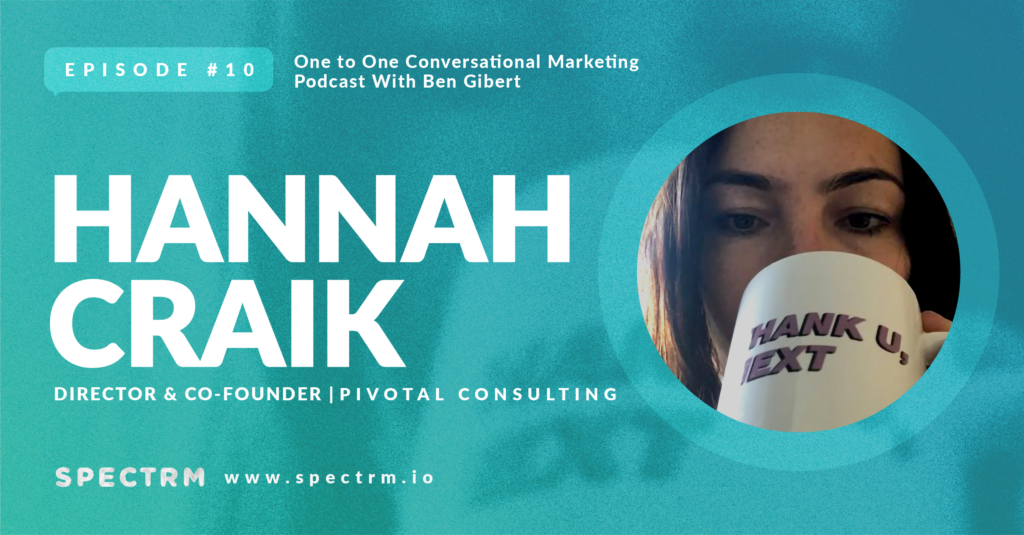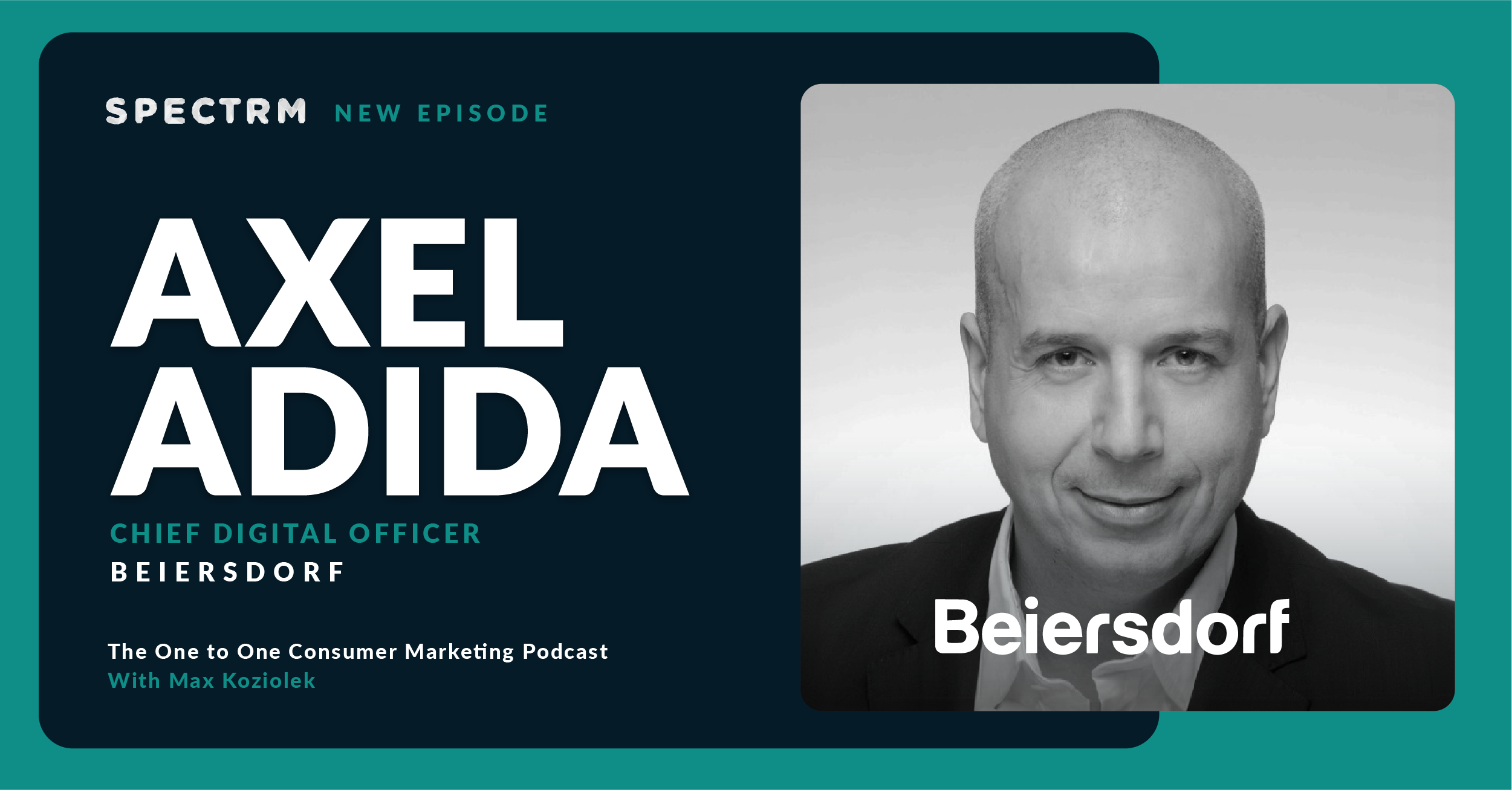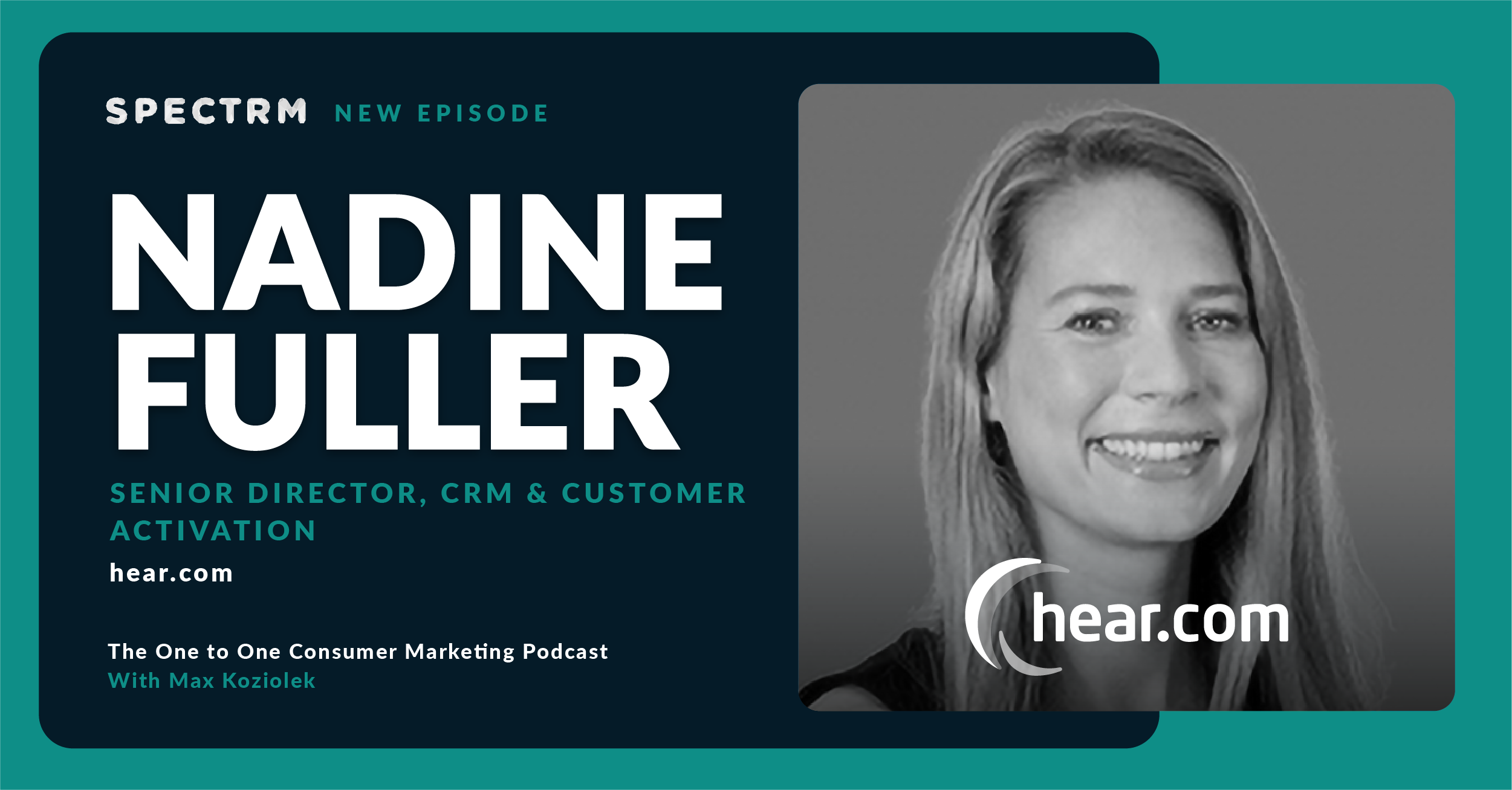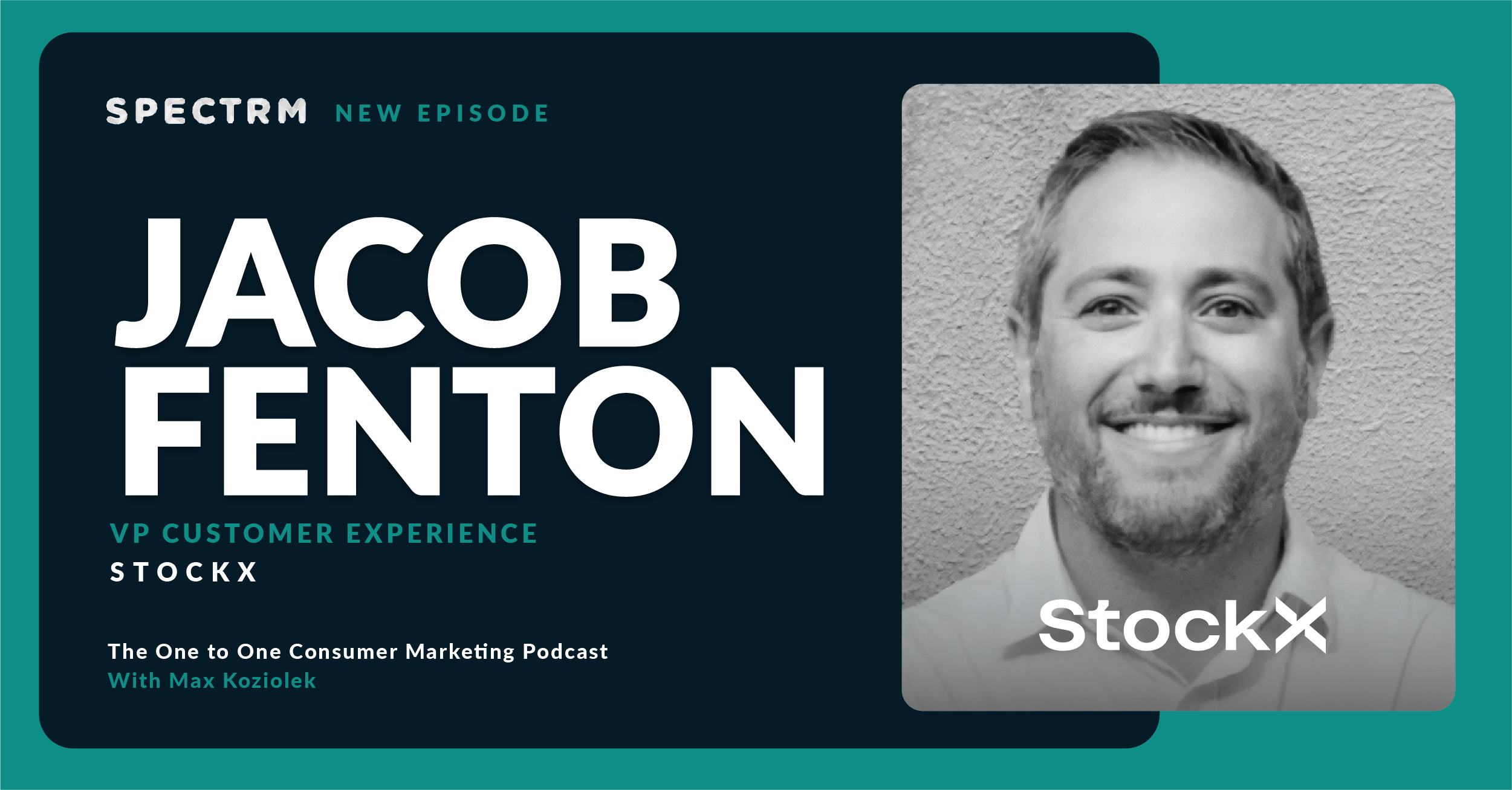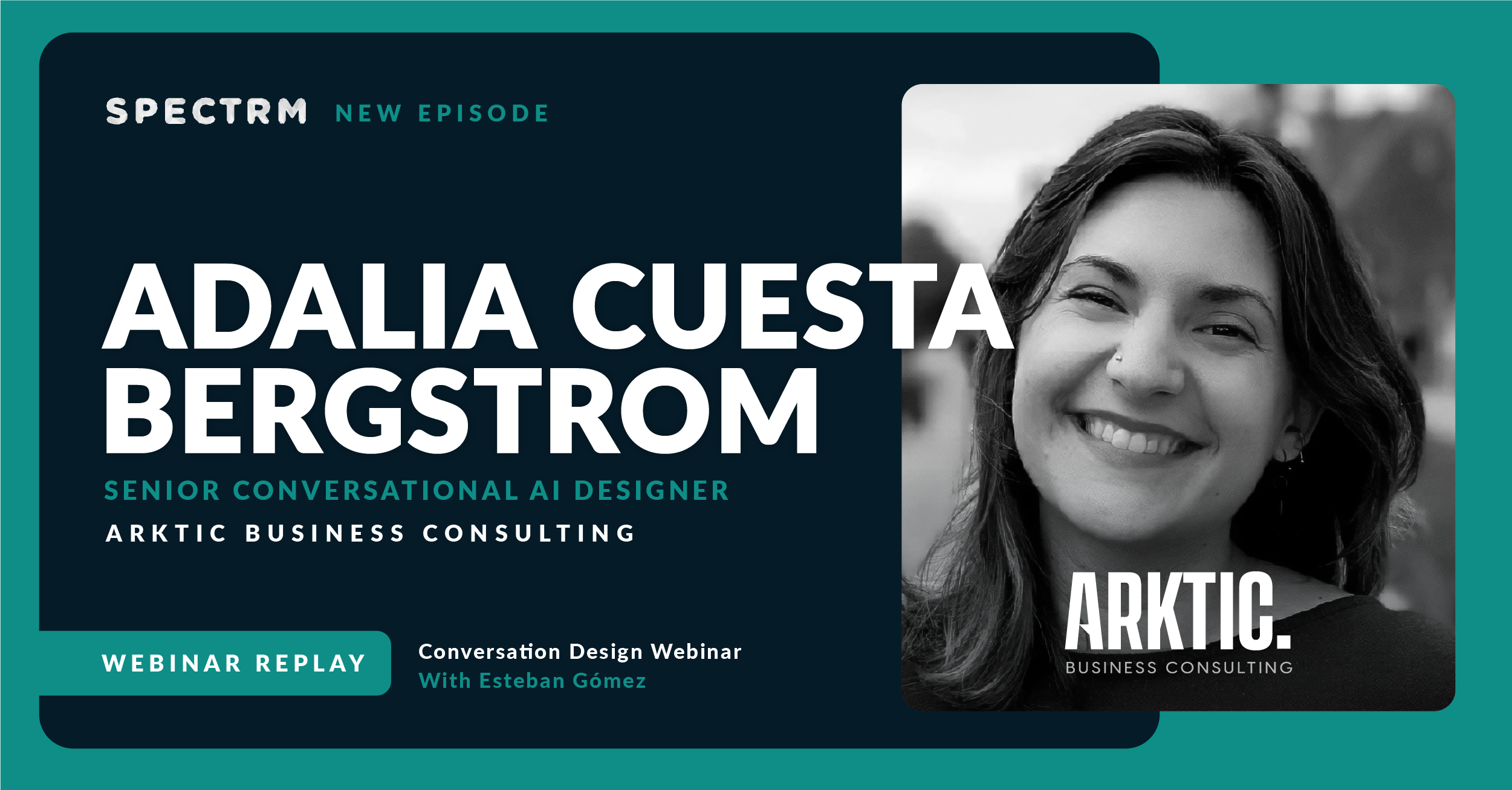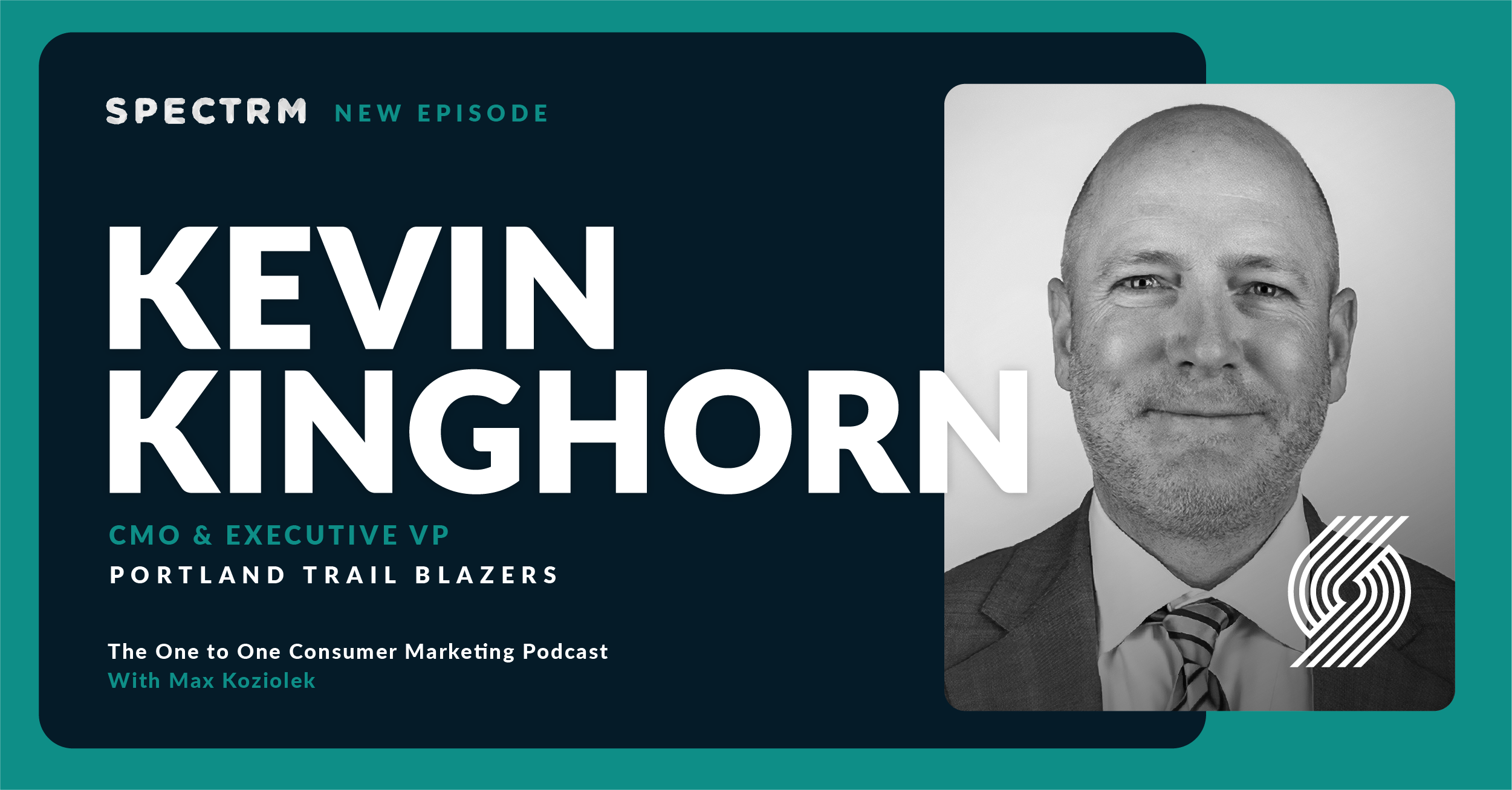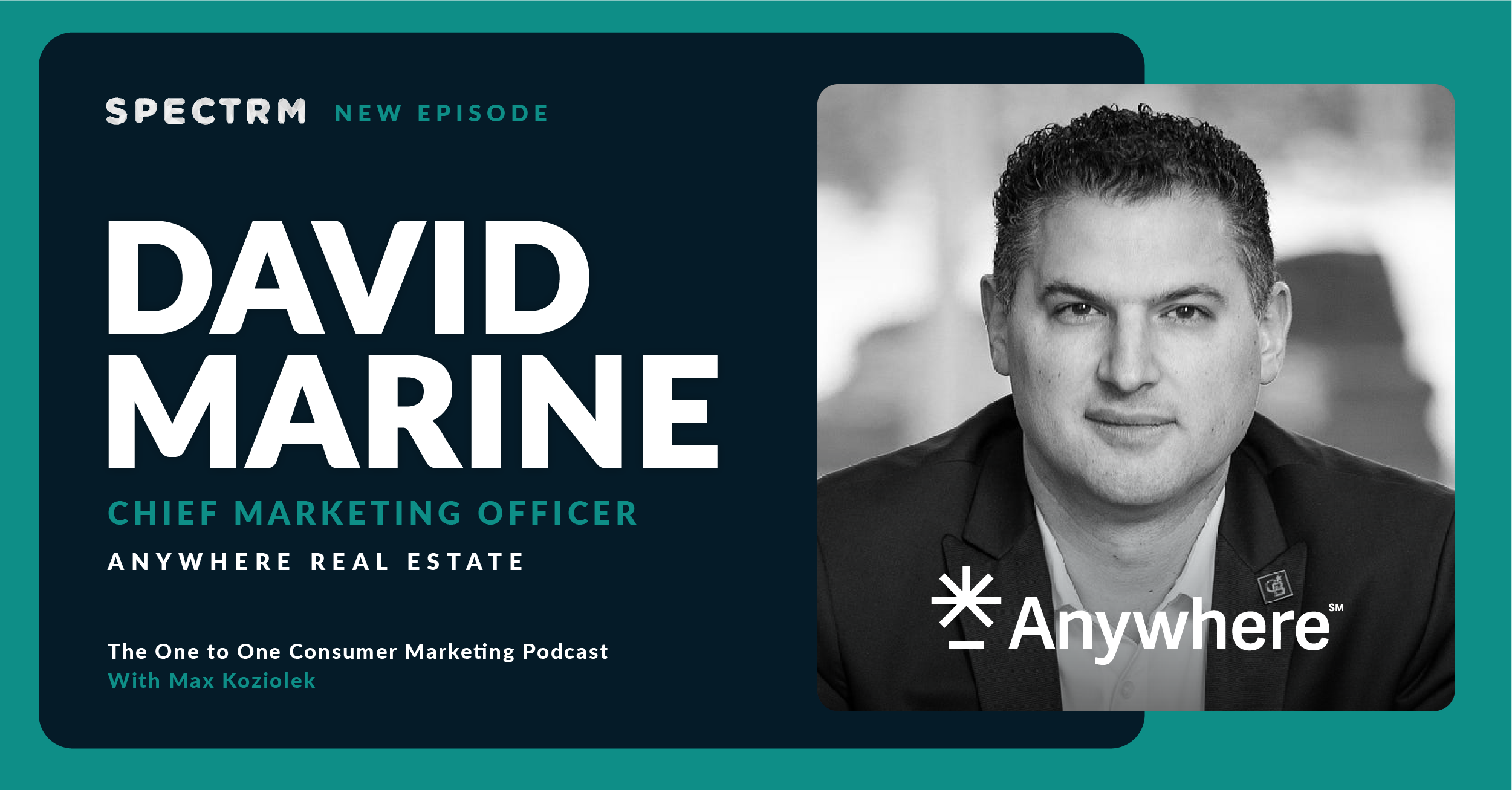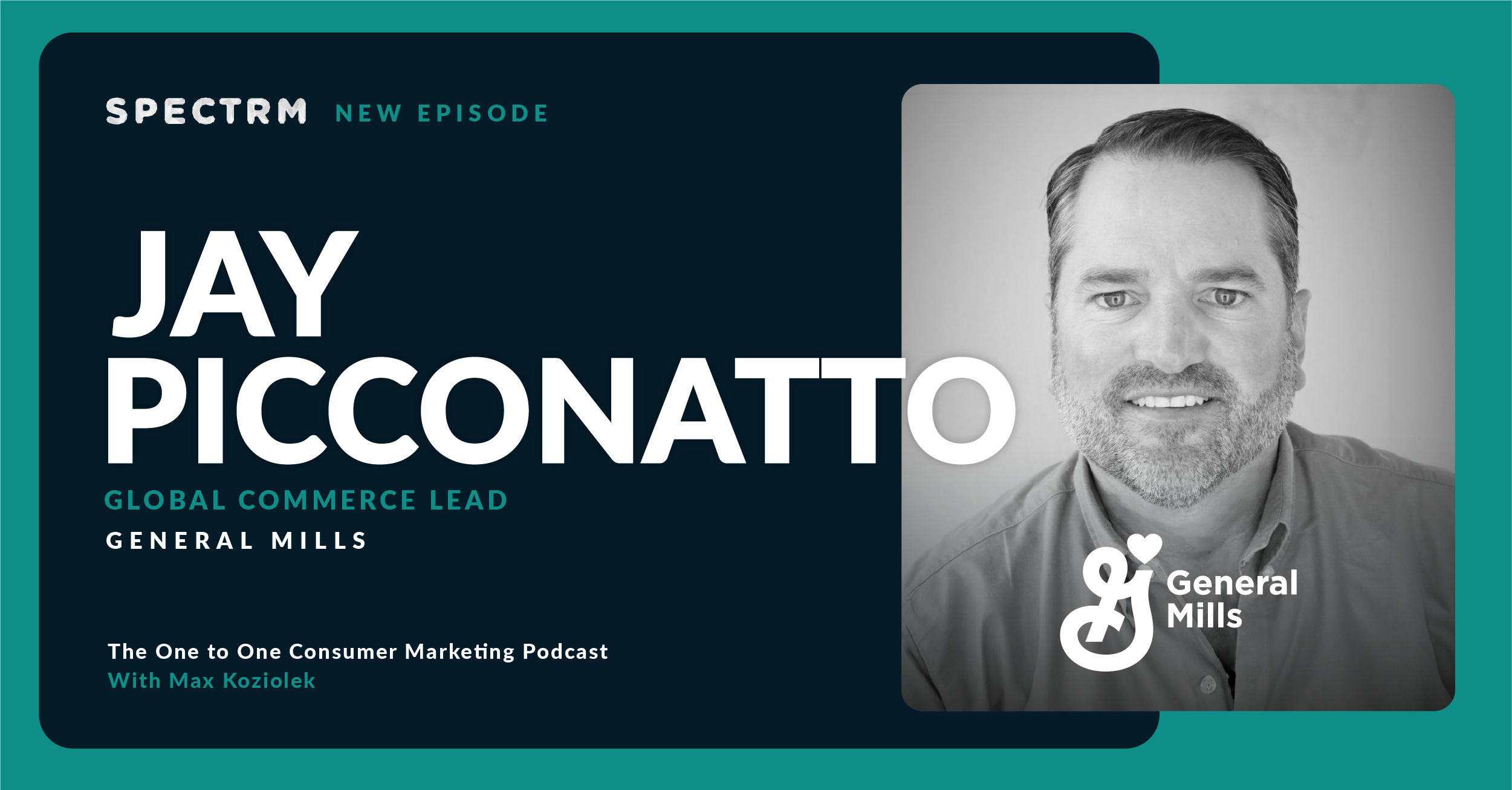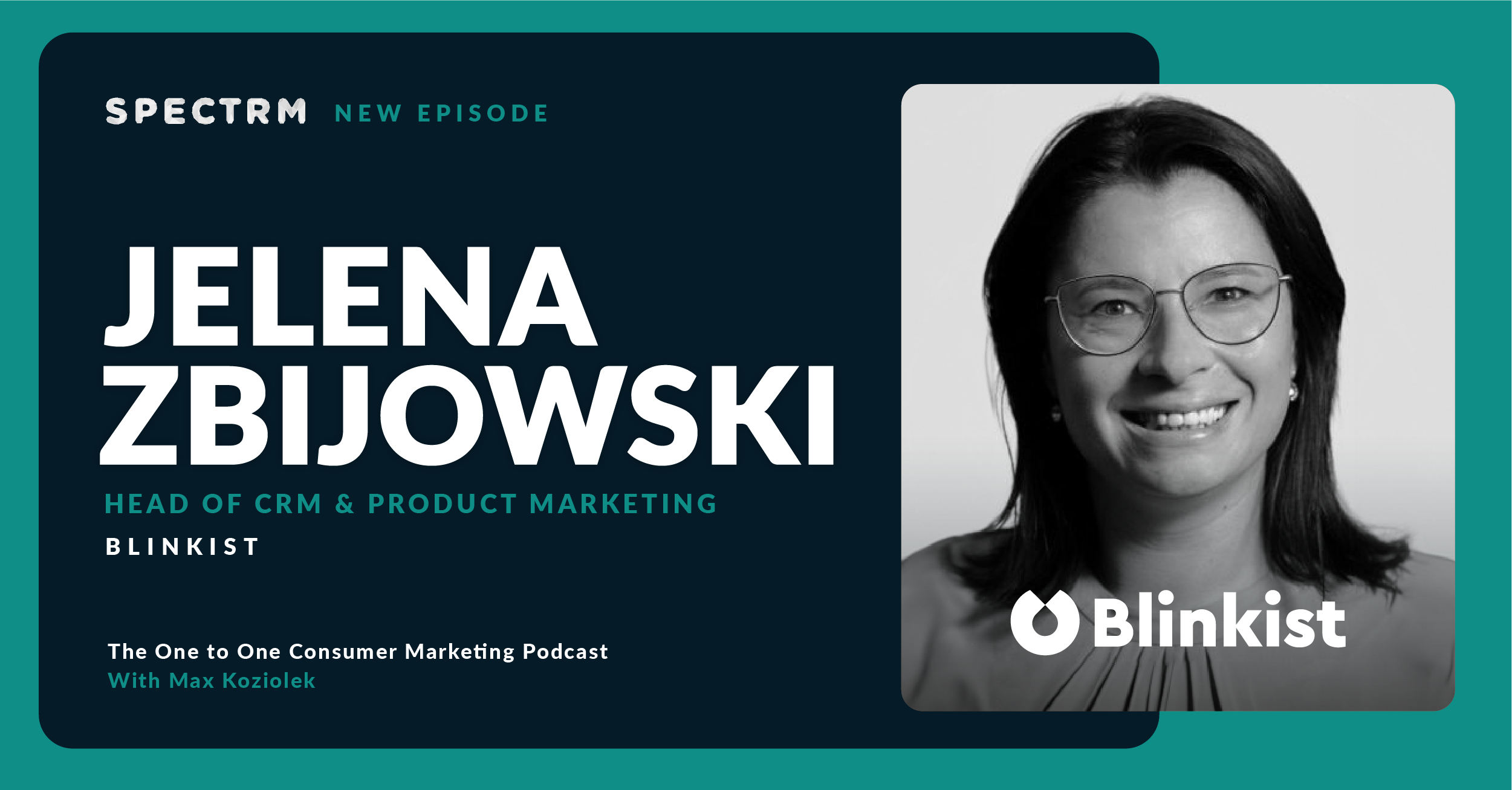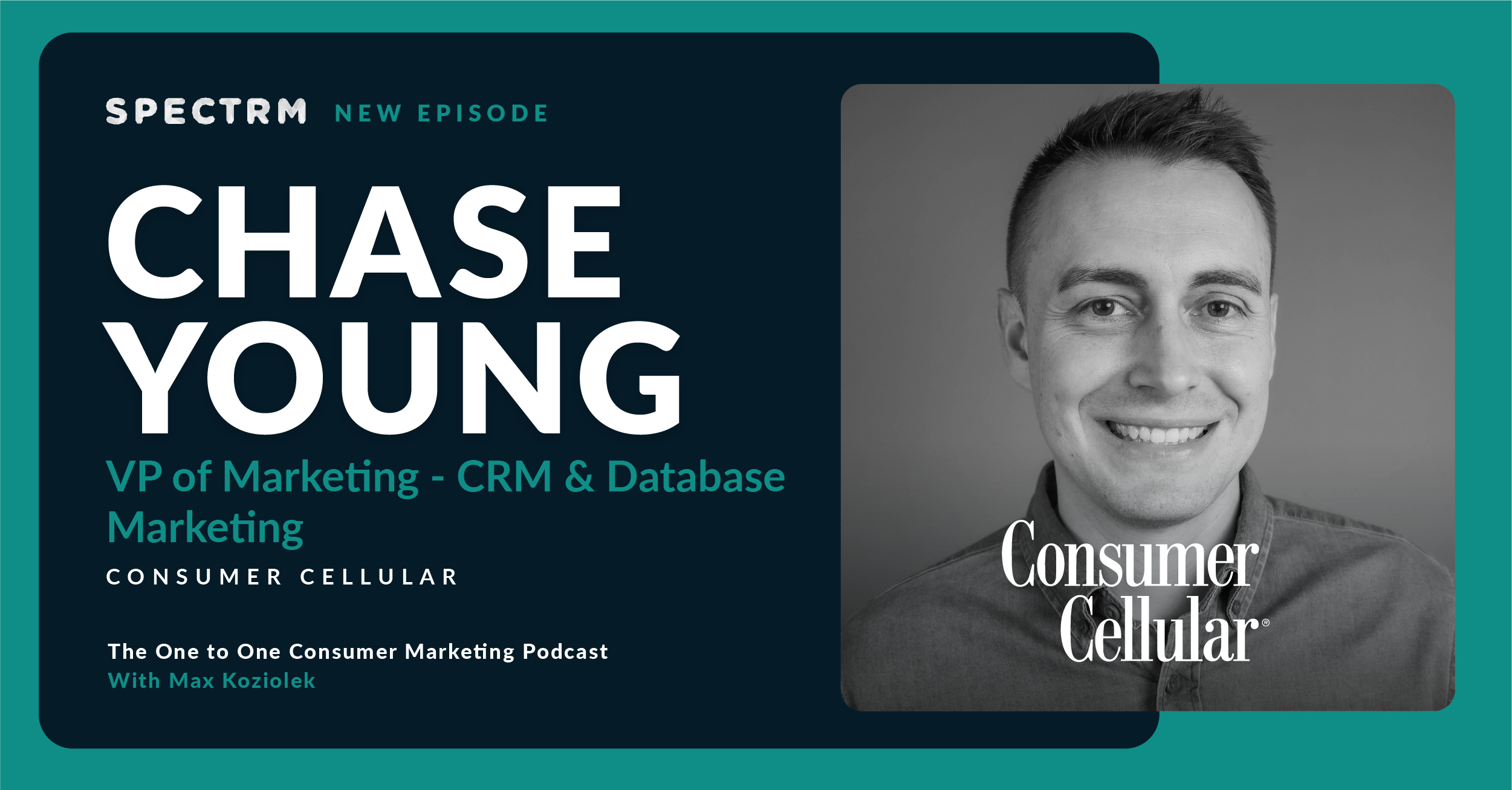Summary
On this episode of One-to-One Conversational Marketing, Ben speaks with Hannah Craik, the Marketing Director at Riess, who has 20 years brand and digital experience – both in leading agencies, including Pivotal Consulting, which she co-founded, and at disruptive brands, like ASOS and Heist.
Hannah’s recent work has been predominantly in retail where she is pushing for more responsible practices alongside more transparent communications. Other areas of focus include a broad range of sectors, such as technology, entertainment and government.
Topics discussed
- Hannah’s perspective on digital marketing today as both volatile and exciting
- How the duopoly of Google and Meta is being challenged for the first time
- Why a cookie-less world can be good for the digital marketing community
- What one-to-one personalization means to Hannah
- The challenges Hannah has encountered with one-to-one personalization
- One-to-one service personalization versus product recommendations
- Why showing up for customers with service personalization will up level their digital experience
- Hannah’s experience with the chatbot hype cycle of boom, bust, and growth again based on new technology and channels
- Why it is harder to drive repeat sales in the apparel category and her advice for what can be done
- How recommendation algorithm bias plays out in fashion and apparel
- Hannah’s top 3 pieces of advice for other marketers looking to better meet consumer demands
Guest biography
It just feels like actually there's just so much more that you can be doing in the space now than maybe there has been prior, certainly prior to 2019. The other thing, obviously is like, everything moving to a cookieless world. I actually think it's really good for the digital marketing community. Like, I think last click has made us all a bit lazy.

- Splitting my time between Reiss and passion projects as a marketing consultant at Pivotal, I have nearly 20 years’ brand and digital experience – both in leading agencies, including Pivotal where I am the co-founder, and at disruptive brands, such as ASOS and Heist.
- I have excellent transferable planning, commercial and leadership skills, and have a track record of creating relevant and challenging work. I am comfortable in all kinds of organisational setups, with experience ranging from independent consulting to leading large teams. My recent work has been predominantly in retail – where I have been pushing for more responsible practices alongside more transparent communications, but I have experience across a broad range of sectors, including technology, entertainment and government.
- I graduated from Cambridge University with a BA Natural Sciences in 2005. I have also completed professional courses at the Account Planning Group (Strategic Thinking: What it is & How to do it), Ashridge Business School (The Leadership Experience: Leading on the Edge) and The London College of Fashion (Fashion & Sustainability: Understanding Luxury Fashion in a Changing World). Outside of work I am a film, TV and sports fan and I speak (pretty good) French.
Company overview
The Reiss philosophy centers on creating and producing directional, design-led menswear, womenswear and accessories. Reiss prides itself with an uncompromising commitment to delivering innovative, original products combining exceptional design, quality and value.
Industry: retail | www.reiss.com
Subscribe to the podcast newsletter
Transcript
00:00
Welcome to One to One: The Conversational Marketing podcast dedicated to helping modern marketing teams succeed in a messaging first and privacy first world. In each episode, we’ll interview a marketer who is winning with conversational marketing to distill best practices, lessons learned, and actionable takeaways. Here’s your host, Ben Gibert, VP of Marketing, Spectrm.
00:32
Ben Gibert
Hey, everyone, and thanks for listening to One to One: The Conversational Marketing podcast. Today I’m speaking with Hannah Craik, co founder and director at Pivotal Consulting. Hannah, thanks for chatting with me today.
00:44
Hannah Craik
Hi, it’s lovely to be here, Ben, thanks so much.
00:47
Ben Gibert
Yeah, I’m excited for this one. I know we had a chance to catch up for a few minutes earlier the other day and I think there’s a lot of really interesting topics that our audience is going to be very excited to hear your perspective on. So, yeah, I’d love to start with just tell us more about yourself, your background and how you ended up in your current role as a co founder of Pivotal Consulting.
01:08
Hannah Craik
Sure thing. I guess I’m now like a generalist marketer, but I’ve got a really strong digital heritage. I started in digital agencies back when digital agencies were working on Bebo and MSN Messenger and that’s all there was, which probably half this listenership might not even remember. Working on government communications in the UK. Telling people to stop smoking and drink less and do their tax returns and things like that, and then I’ve been doing that for a long time, I through that. Ended up running quite a lot of social media pages, actually, for armed forces recruitment and things like that. I realized then I did that more broadly for other brands and then I realized that if I wanted to do social media really well, which is what I was in at the time, I’d need to be doing it for a brand. I moved to Asos, which is like the OG fast fashion ecommerce retailer here in the UK, and set up their social media team there.
02:03
Hannah Craik
From that I’ve probably started to do every job in the marketing department. I was there for a really long time, so that’s informants marketing in brand marketing ran the CRM team through when we had GDPR legislation coming in the UK and Europe, which was an absolute nightmare. Ever since then, I’ve been in retail. After I left Asos, I worked for some startups and scale ups. I’ve also worked more in attainable luxury rather than just fast fashion. Also Reese, which is another big establishment UK fashion brand, and then also with other beauty and interiors brands, but always really in those kind of aesthetic industries. Then, as you said, I recently set up Pivotal Consulting, I mean, literally like four weeks ago. I guess it’s ultimately to grow the brands that we think our planet needs in the future. I could probably tell you or probably work out as a marketer how many items of clothing I’ve sold that have only been worn once and are now in landfill somewhere.
03:03
Hannah Craik
I think we really want to work with those impact reducing brands in those industries and define what’s desirable for the next ten years. That’s a bit of a whistle stop chore.
03:14
Ben Gibert
Yeah, thank you for that. I think that you’ve clearly had a lot of experience, as you said, in the fashion attainable luxury apparel industries. I think we have definitely a lot of listeners that work in those industries as well. I think your insights are going to be very interesting. I’m sure that I guess it’s interesting to see your shift over towards something more sustainable or the desire to make that shift. Because I’m sure, yeah, the footprint of the fashion industries isn’t always an amazing one, but like with most industries and I think that’s also the shifting consumer interest in also buying from brands that are sustainable and that do kind of fit with their values is something that I’m sure means that you’re in an industry that will be growing rapidly as well. You mentioned working for Asos, the OG fast fashion retailer in the UK.
04:00
Ben Gibert
They’re obviously massive large product catalog and all these different roles that you worked in. I’m sure that gives you a very good understanding at this point of what the state of digital marketing is today. You touched on GDPR, the fun of consent management and all of that stuff. Can you maybe just quickly summarize how you see the market and kind of what the industry feels like to you today?
04:22
Hannah Craik
Yeah, I actually think digital marketing is like the most volatile and potentially the most exciting. It’s been, I don’t know, maybe for a decade. I feel like for a lot of the last ten years, particularly when I’ve been doing consulting, but even when I’ve been in house, I’ve been probably the main stage of those media plans and partners have been Google and now Meta, but either the Facebook or Instagram platforms. Probably that duopoly is maybe being challenged for the first time in a really long time. Like, everyone’s obviously talking about TikTok at the moment, but I think that there’s also lots more interesting happening in affiliates and there’s a lot more interesting stuff happening with content partnerships and there’s also just this idea that everything is digital now. Like, I don’t know, podcasts, like, are they just radio, but digital like broadcast video on demand.
05:13
Hannah Craik
It just feels like actually there’s just so much more that you can be doing in the space now than maybe there has been prior, certainly prior to 2019. The other thing, obviously is like, everything moving to a cookieless world. I actually think it’s really good for the digital marketing community. Like, I think last click has made us all a bit lazy. I was on a trading program with Google a little while ago, and it was specifically about YouTube, and there was someone I mean, this was earlier this year, literally someone from YouTube saying, and I don’t know if but not all of YouTube’s value is recognized in last click. It’s like, oh, goodness, no way. The rest of us have been worried about that for the last decade, Google. But, like, nice of you to have caught up. I think that it just feels like we can be doing better plans, we can be doing better creative, like, we can be doing better measurement.
06:04
Hannah Craik
But there’s also a lot of unknowns. Definitely the most exciting. It’s been, I think, five or ten years.
06:10
Ben Gibert
Yeah, I actually couldn’t agree more. I think the laziness aspect is exactly what it is. It was such a black box, and it continues to be, but it was much worse for a long time. That over reliance on the algorithm on just basic last click conversion tracking and attribution and optimization has really made digital marketing very accessible to a lot of people, but also has made it much less powerful for the people that really are into the industry and want to do some of the more complex either attribution or just really understanding the full customer journey. I think you touched on the digitization of some of those things, like podcasts, things that are not necessarily new, but that are being brought into a digital mix in a way that’s actually very exciting and I think poses challenges, but also a lot of really exciting opportunities for digital marketers.
06:58
Ben Gibert
I mean, I think you touched on the loss of cookies and data aspects. I think one thing we talk about on this podcast a lot is one to one personalization and understanding how brands activate their data or what types of customer experiences they provide. Can you talk to me about what one to one personalization means to you, particularly from your experience in the fashion and apparel industries and maybe some of the key challenges that you’ve encountered in your roles?
07:26
Hannah Craik
Yeah, sure. I think when we talked about this before, my immediate interpretation of that is that it’s individual conversations or messages with every single customer or potential customer, which I’ve got a bit of an allergic reaction to. Like, I’ve never seen it deployed particularly elegantly or seen it deliver a return for what you have to put in to make that work even kind of a bit. Well, so for me, I think particularly in apparel, when you think about it in that context, once you get past is this person shopping for men’s, women’s, or children’s clothing? This person a student or not a student? This person new to my brand or have they bought from my brand before? Once you’ve done those parameters, everything else fades into insignificance. That’s definitely been my experience. I sat on the personalization steering committee at Asos for a really long time and I have closed down many other similar work streams in my time.
08:23
Hannah Craik
I think the most like the example that went round felt like we’re all talking about for two years was particularly like you can tell, like Jill in Manchester that it’s raining and she should buy a coat. You just think that’s not like inspiration, like apparel marketing and Jill knows it’s raining and if she hasn’t got a coat on, she’s wet already. I don’t know, you can tell. I have never found that particularly compelling idea for one to one personalization. I do think there’s something in how you personalize service for brands in this category and particularly for more premium brands or more experience based brands, and maybe that’s where the opportunity is. I think I’m still skeptical about whether everything is in place to deliver that side really well. I think you still have to I don’t know, I think we’re in that light. I’m in the trough of disillusionment in that cycle of one to one messaging at the moment.
09:25
Ben Gibert
Yeah, I love that analogy. I think we spoke about this a bit before but I think that’s what I was also excited to talk about today is having seen that hype cycle kind of boom and bust for chat bots or one to one personalization and now there are kind of new channels and new tech emerging so maybe there are some new opportunities there. Before we dive into that, I’d love for you to unpack what you said about one to one service personalization versus just kind of product recommendations and things like that, because I agree with you, I think there are very quick limits as far as kind of what you can do on just fashion recommendations. Right. You mentioned inspiration and how that’s such a key component to it. Right. You might not want to offer a coat to someone when it’s already raining outside.
10:11
Ben Gibert
You might want to inspire them based on your new collections or you might want to inspire them based on an understanding of what types of things that, they’ve bought before or that they like. Or how does that work for you? What do you see as the value in service personalization and why do you think it’s a more interesting place to be focused on?
10:28
Hannah Craik
I think one of the things I definitely know, and I’ve probably got to quite biased because I’ve worked generally either in pure play ecommerce or in brands where they’re trying to deliver huge amounts of digital transformation. So it’s always been huge emphasis. I think we really see, particularly in a UK customer. True across Europe and the US when I’ve worked there as well, that self served problem solving is actually most of the time what people want. If they need some kind of service from you, they want to know about returns or they’ve got a styling question or a site. They don’t necessarily I know there’s this idea that everyone’s nostalgic when they could call someone, but not that many people actually want to do that. They do want an easy way to deal with that. Certainly when you get self serve or automated service propositions, right, customers really like them.
11:14
Hannah Craik
So there’s definitely like a service layer. I think from the apparel industry, if you think about what really great sales assistants do in luxury stores where they’ve got their own speed dial for all of their clients and they’ll, I don’t know, fly them out. The handbag they need when they’re going to dinner in Milan or that kind of thing. There is an opportunity, I think, to make that feel of level of service and customer care and VIP status. Bring that a bit more mass market. That for me is where the opportunity would be in the apparel industry, I think, because to your point, we talked about this a bit last time on recommendations and thinking about things from that side and apparel and that’s just a product level, it’s just not I just can’t imagine how automation delivers that. Whereas at a service level, I can really see how you can make your digital experience completely something else.
12:12
Hannah Craik
If you take that further into and we’re definitely going to the limits of my understanding, but what the metaverse is going to mean for fashion in the future that is going to involve more interaction and you are going to have to offer a digital service that you do not have to offer today.
12:30
Ben Gibert
Yeah, I think especially I really like some of the examples you mentioned on the service level as well and also not seeing it as I think people sometimes conflate service with customer service. Obviously what you’re talking about is customer care and the ability to address customers like that self serve aspect when they do have return questions, kind of order questions. You also touched on the styling element and the gap that exists maybe in the digital space right now, sometimes, where that’s the opportunity that you can bring that in store, concierge that assistant, that style assistant into the digital realm. That can actually have a very positive impact on customer experience, but also on the ability to sell more products or to actually inspire people in the right ways to increase order volume. I think that’s something that I think is really interesting with this space as well, in this one to one space and you definitely obviously see that opportunity.
13:22
Ben Gibert
I think you mentioned that recommendation algorithms are notoriously hard to drive repeat sales. I think I’d love to understand, based on your experience, why do you think automation is harder in the category? Like, did you encounter specific challenges at Asos? I mean, Asos obviously has a massive product catalog, so you would think there’s a lot of opportunity for kind of cross sell and upsell, but I’m sure that there were also a lot of logistical issues that came with that. Can you talk a bit about your experience?
13:51
Hannah Craik
Yeah, I can. I think that the other example I think is really good here is Amazon, where Amazon dominates an awful lot of online retail everywhere. I think certainly a couple of years ago, like nine out of their top ten worst performing brands were all apparel brands when they published their own label report. It’s not posed the threat, I think, that lots of us who worked for traditional fashion brands thought it would. I remember working in 2014, 2015 and all being really worried that Amazon was just going to wipe us all out. I think that comes down to the same thing, is that what makes the parameters by which you buy another book are not the same as the parameters by which you buy fashion? I say that I love trashy crime thrillers and absolutely I finished one trashy crime thriller. Someone can recommend me another one and I 100% will want to read it.
14:44
Hannah Craik
I think I have probably have ended up down a bit of a wormhole now, and that’s probably all I read. I do want quite often more of the same, and I think that’s true across the same in baby wipes. I don’t need a lot of novelty. I think there are three big limitations recommendations in apparel. I think one of the first ones is just like just because something about what someone’s bought, like, it can be quite hard to work out what’s next. The example I give this when I was working on recommendations at Asos is I had just bought like a mini cross body yellow, bright yellow handbag. I don’t need another one, I don’t need one in green, I don’t need one in blue. It’s hard to know what I do need to go with that from how do you codify that into something that also aligns with my taste?
15:31
Hannah Craik
I think it’s just like that is just, I think, just a much harder brief, if you like, for a development team. I think the second things is around novelty and future trends. Fashion is driven by novelty and what makes a great buyer is someone who can say people are going to want that. They don’t know they want that yet, but they’re going to want that. And again, how do you tell? Nevermind like, a team of people who are writing an algorithm that’s what people need. People are going to need the thing that we don’t know they need yet. How do those people tell an algorithm? Again, for me, that is incredibly hard to do. I think the last thing, if I’m honest, is just so biased in developers. The developer community worldwide is not hugely diverse, although there are lots of amazing places making great strides.
16:27
Hannah Craik
I think actually that just makes it hard to what you’re ultimately doing in a recommendation rappel is trying to codify nuances in personal taste. If you’ve only got a certain amount of people’s taste accounted for. Also notoriously, the people led by Mark Zuckerberg, who wear a gray t shirt and blue jeans to work every single day of their lives because they can’t think about fashion in the morning. How do they accommodate for the fact, like, I never buy anything above the knee because they’re on my knees? Or, like, someone I know will never, ever wear skinny jeans? Being able to deliver that at a personal level, being able to interpret that is really, again, really hard. Also if you’re the user of that, if you’re the person receiving the results from that, those things are really obvious to you. So I think that kind of dissonance.
17:17
Hannah Craik
They feel like the real big areas that are hard.
17:22
Ben Gibert
Yeah, there’s so many interesting things to go into there. I think we’ll come back to the bias in the algorithm aspect because I think that’s something that is I’d love to hear more of your perspective on, given your experience in the industry before that, I think touching on the limits of product recommendations. Just like you bought this, therefore you might want this in similar color, in similar size. The limits and Amazon, the ultimate book recommendation algorithm. Like failing to do that in fashion. I think based on your description, it makes perfect sense that would be a failure. I think where it maybe is interesting going forward is touch more on that inspirational service side as well. I’d love to understand, do you see an opportunity there in sense of, okay, it might not be that the algorithm is about recommending the exact product based on your previous purchase history, but that it’s more about enabling self service and enabling inspiration, right?
18:17
Ben Gibert
If you can find ways to interact with consumers more in that personal style assistant way where it’s more about, hey, let’s explore the new collections that are coming out. What do you think of these five things? Which one do you like more in terms of style rather than specific products? Maybe show lines or show things that help them understand and navigate what is taste and what is taste right now and how is that evolving? Do you see value in that over the just pure product recommendation approach?
18:46
Hannah Craik
Yeah, I definitely do. I actually think being able to inject novelty and how you do that. Again, I’m not a developer, I’m also not even a product marketing specialist. This is again quite the limit of my understanding. I think there’s something quite interesting about thinking like how do you inject novelty in a way that makes sense. I think the two areas you really see. One of the really interesting things I think people see a lot when you let Google have control over your product feeds. When you’re doing shopping ads or PPC ads, what you tend to find is what you tend to see, in fashion, quite a lot is unless you give it guidance. It biases towards products that’s been on site for longer because it knows more about it. If you work in fashion, you have to train it that it has to look at new stuff.
19:35
Hannah Craik
Because actually new stuff is really important for sales and fashion. That’s one of the things where you see it I think it’s a bit embedded in algorithms that they where there’s information more than they like novelty. And I think that’s an opportunity. It’s like how do you override that? How do you bring new collections or get customer feedback on new collections? Kind of into that. And that could be really valuable. It could be ways of showcasing things or like finding things, particularly if you’re somewhere like Asos that has bazillion products, finding things that might not get surfaced otherwise that could actually be like real winners for you. Like it should be something that could be a competitive advantage. The other place you really see it is also just in not bordering your customers. There’s an amazing article on the Atlantic from earlier this year about, I think it’s called something like Fashion Has Abandoned Human Taste.
20:27
Hannah Craik
It’s about the fact that because so much fashion is designed now using automation and these kind of principles of what’s worked previously, there are trends that outlast even regular people’s desires for them because they persist weirdly in algorithm. I think again, there’s something quite interesting in learning like not only how do we inject new things and get customer feedback on that, but how do we understand the signals of when customers are bored of things. I think that is what people talk about. One of the reasons TikTok’s been so successful is it looks at what people don’t like as well as what they do like. Whereas historically Facebook has looked a lot more at what people respond positively to. Again, we’re probably very much at the limits of all my understanding about algorithms.
21:17
Ben Gibert
I think there’s some really interesting stuff in there as well, injecting like you said right, the algorithm biases what it knows and it biases towards information. I think that point about product catalogs in fashion and the desire of the algorithm to go towards, okay, it knows it’s had more clicks into this previous category, into these particular products, and it can crawl more metadata for those products on your site because they’ve just been there for longer. Like indexability is such an important part of that whole thing. It’s completely understandable on some level that the algorithms do that. You’re right, I think from a fashion perspective, what is interesting is injecting that novelty, I mean, I think if I think about some of the customers that we have at Spectrm, what they do is probably more on the curation element, right? Like, they use this automation, one to one messaging as the medium, but there’s still very much kind of marketers and tastemakers that are guiding that.
22:12
Ben Gibert
It’s not purely algorithm based because it runs into the limits that you’re talking about. You do want to enable that level of curation and then the feedback process both positive and negative. I think the negative being a very important one that’s often overlooked as well. I think, yeah, there’s ways to get around that a bit, but I think that’s completely fair. Do you have any other thoughts on how kind of bias and recommendation algorithms plays out in the industry? Like, what are kind of the biggest issues? Do you feel like it I know you’ve touched on how it impacts the development of novel trends and that sometimes it even outlasts what consumers want. There any other ways that you see that affecting the ability of fashion brands to kind of connect with consumers.
22:57
Hannah Craik
Maybe a little bit? I mean, I think you’ve got particularly when you’re talking about this specific area between fashion and technology or digital infrastructure, I guess you’ve got the double of like, fashion can be quite an exclusive privileged industry and technology can be the same. I think you end up with the center of that Ben diagram where maybe there’s not a huge amount of inspiration always being drawn from outside of that. Whereas if you think about the design process and fashion buyers still are like, traveling all over the world and going to different shows. I think that sometimes it can feel insular and I don’t necessarily know how that manifests, but that I feel like can only manifest in something that doesn’t really deliver on the true excitement of fashion particularly. I think that’s maybe one of the places you see it, but I do think maybe it just comes out in things being more boring than they should be.
23:56
Hannah Craik
I think that would be my number one criticism of a lot of automation in fashion is it like it can make things boring. I think there’s loads of if you take it outside of thinking about those specific industries. One of the things we know generally is loads of research. If your team’s lack diversity, they’re less creative. I think it’s probably what you need when you’re trying to develop an algorithm that can inspire people within the apparel industry. You probably need a lot of creativity. I feel like it’s one of those areas, like both industries, both fashion and the tech industry is really trying to address those issues at the moment. So, I mean, hopefully we’ll see a bit more ingenuity maybe in the future.
24:43
Ben Gibert
Yeah, I think there’s plenty of space for innovation. It’s funny you mentioned the Venn diagram of fashion and engineers when you said that in my head, I’m like, I don’t know if there is an overlap in my head. I’m sure there is one, but to me it was just two circles in different places. I think what you touched on as well is maybe it’s taking the fashion part out of fashion and apparel and just making it apparel because there’s no longer that creativity. There isn’t, as you said, the innovation. There’s no longer the taste driving from curators, from people who spend their whole lives trying to understand human taste and like the next trend. I think that’s a very good point that it’s something the industry has to address. I think, as I mentioned, there are some opportunities there in the way that we think about automation.
25:26
Ben Gibert
Maybe not just purely from an algorithmic standpoint, but just from the communication standpoint and how the messages get delivered. I think, yeah, some very interesting things to look out for.
25:37
Hannah Craik
You mentioned also about the platforms and the one to one messaging and all of that. I actually think one of the huge opportunities here is people love looking at and talking about fashion. In terms of getting feedback from actual people, if you work at a fashion brand, people will browse your website. Not everybody, but for 20 minutes. They’ve no intention of buying. They just want to look at the same way they’ll browse Instagram or TikTok or watch a YouTube video or whatever. It’s not like, I mean, I started my career trying to get people to stop smoking. That is very hard work. Like, nobody wants to talk to you about that. People want to talk to you about handbags or trainers or whatever. There’s lots of opportunity in terms of it is an industry people will want to talk back to you in.
26:19
Ben Gibert
Yeah, it’s a fun process, I think, if you think about how you would train something right. On the website, I know TikTok has gotten very part of that algorithm, is also kind of dwell time on video. I mean, I think that’s part of most algorithms these days, but like, dwell time on content, on posts, on videos as an indicator of interest, even if someone doesn’t like the post or anything like that. I can imagine fashion ecommerce, like major ones are looking at dwell time on product pages as an indicator of interest in that product. But it’s very difficult to operationalize. I think as you mentioned, messaging like that opportunity to just show people and be like, do you love this, do you hate this? Even if you went as basic as the tinder approach and just swipe left or right on this, there’s so much feedback you can get and understand someone’s personal taste that I think it’s a very interesting space to be in.
27:06
Ben Gibert
I mean, having said that, I think you have mentioned to me before as well that apparel recommendations often kind of just default to the best sellers and trends. Like that flattening of ingenuity of creativity. Do you see value in kind of personalizing the messaging? You’ve talked about messaging apps, but are there any other channels that you’re excited about where you kind of see a lot of opportunity to do something different here?
27:29
Hannah Craik
I think probably the other place, which again, almost brings me back to that point around service is in better understanding so that you can do things like reduce returns and reduce wastage. There’s loads of really interesting businesses now. There’s one in the UK called Harpers who do like a concierge service for online brands. They’ll bring to your door the items that you might want to try on like a capsule version of that. Again, not every brand can offer that to every person, but doing that at a kind of level. Again, for me, that’s still about service. I think the other thing that’s interesting, which also plays on the other point were talking about is I also don’t think in fashion, like a customer telling you they don’t like something, it’s not necessarily a negative interaction from a customer’s point of view. It’s probably still better than no reaction, if you see what I mean.
28:21
Hannah Craik
That doesn’t mean they didn’t enjoy it and that you can’t learn from it in the future. Definitely that for me, again, it just comes back to like and that might include bestsellers and you probably always if you’re going to show someone sweet products, yes, you should probably include some bestsellers. They’re best sellers for a reason. I think it’s about what the fringe is. I think the other thing is the thing about fashion is like what you see is not what you buy. I’m going to both get the actual numbers of this wrong and I can’t remember which brand this was for, but the principle is true. There was a point in time where I was working on a brand and someone searched black dress and went in, Google, went onto this brand, made a transaction, only 40% of those transactions would be either black or address.
29:07
Hannah Craik
It’s also true, like most people, even when I was Asos we used to show lots of pictures like pink furry coats and wild printed trousers. Most of what people buy is, like, blue jeans and white T shirts. It’s not even to say that the best seller isn’t what they’re going to buy. I think it’s also not only do people not buy what they say they’re going to buy, they don’t buy it because you showed them it. I think it’s, again, just like, what’s novel? Like, what’s inspirational? Even if I don’t want to buy a pink furry coat, I want you to show it to me because then maybe I want to buy the blue jeans because maybe I’m edging towards a pink furry coat. For me, it’s still like, how do you use it to be inspirational?
29:50
Ben Gibert
Yeah, I think that’s such an important point when it comes to fashion, because it almost simulates being back in the store. Right? You want to flick through everything on the rack and be like, no, don’t want that, don’t want that. Yes, this feels like me. Even if your reaction of this feels like me is the reaction that 80% of other people had, it doesn’t matter. You are validated in your choice by the mere action of actually going through and browsing things. It totally makes sense that in the digital world, even if those are not the highest converting products, that they should still show because it helps to validate the choice. It also gives that kind of feeling of, okay, I’m shopping. Like, I’m exploring, I’m understanding what is taste. That’s something that I think I’m sure people could program some part of that into an algorithm, but in the way that we traditionally think of kind of recommendation algorithms, it does run against the grain of what they’re designed to do.
30:46
Ben Gibert
I think that’s a very interesting challenge to be thinking about. I mean, I think given those challenges, some of the things we’ve talked about, I think what are the top three kind of pieces of advice you give marketers broadly or in this space that are kind of looking to better meet consumer demand or innovate in the kind of fashion creative recommendations?
31:07
Hannah Craik
Okay, well, I’m going to do a left brain, a wild right brain, and a wild card for my top three. My first one is like, do really I mean, I maybe have not sounded like it for the past 30 minutes, but I do really believe in analytics and data. I did a science degree. There was a point in my life where I thought it was going to be a physicist. I mean, I did not have a big enough brain to do that, but I really do believe in looking what the data is telling you. I do think you have to add common sense to that. I do really think that thing around just like an algorithm. We’re biased towards where the information is. Just because you know that thing doesn’t mean it’s the only thing you can know. I really would say look at the information you’ve got and then add your own common sense to that.
31:51
Hannah Craik
That’s kind of where I think digital technology and humans are good. It’s like we’re actually good at different things, aren’t we? Isn’t it like computers are really good at long division and we’re really good at making tea and it’s not very true the other way around. Add what to what it is telling you rather than just taking what you’re being told. So I think that’s number one. I don’t know, I summarize that like analytics and common sense use both. I think the second thing I’d said really love your creative counterparts. I mean, I’m like a really I’m quite a traditional marketer. Like I am not a creative, if you like. I’ve worked with creative agencies and I’ve worked with in house creatives and I just really think when you both work together, like when those two kind of disciplines or teams, whether that you’re in the same business or not really work together, you always just get more than the sum of your parts.
32:42
Hannah Craik
I really would say embrace all your social creatives and creative directors and someone who wants to talk to you for 15 minutes about why they like this fabric and what inspired them. I really do think that does even if you can’t directly apply it into your marketing, absorbing that is a really like, it can really elevate what you’re doing and give you new ways of thinking about things. I think if you work in the fashion industry or other aesthetic industries, we’re lucky. There’s lots of really creative people in this industry. I also think marketing is a very creative discipline. It’s just we’re not called creatives. It’s different. I’d say really love your creative counterpart. My third one is probably more worthy and harking back, I guess to the change I’ve made in my career recently. I would also really say take responsibility for what you’re making desirable.
33:36
Hannah Craik
Think about when you are showing people product and you’re inspiring them with that product. You are shaping what their tastes are and what they’re going to buy in the future. You can include more responsibly made products in that. Think about how you present them in a way that’s more inspirational and more desirable. You think about how you can use that. Like I say, to reduce wastage or to reduce returns and present them in that way. Particularly in the fashion industry where we’ve got to make a huge amount of transformation in the next decade. If you work in marketing in that industry, you are going to be right now shaping what people want to buy over the next ten years and choosing what’s desirable. I think that there’s a huge amount of opportunity there to make the stuff that our businesses all need to be doing, the stuff that is also commercially really good for them.
34:30
Hannah Craik
I think really things about the responsibility you’ve got as well.
34:33
Ben Gibert
Yeah, I love that. I think the way you’ve broken that down almost feels like it’s past, present and future. Right. You had past analytics. Look at analytics with context. I think that’s I have a lot of people tell me, like, obviously look at the data, but I think you are also saying try to really think about the parameters in which the data was collected and question it, which I think is a really important thing for marketers to always keep in mind and then present. Right. Embrace the creatives. I think that’s a really good thing that people can do now and then looking forward, how do we take more responsibility for the things that we are? The taste that we’re promoting, I think that’s a really nice structure to that. I don’t know if it was intentional, but yeah, really like that. Hannah, thank you for sharing those insights.
35:15
Ben Gibert
I mean, having ended kind of looking forward can you give us a taste of five years from now what you think the future of marketing looks like for apparel brands?
35:26
Hannah Craik
Oh, yeah. So, I mean, I feel like I’m always wrong whenever anyone asks me to predict what’s going to be happening in five years. Really thinking about what our identities are digitally and fashion particularly, is really tied up in our identity. How that comes to life, I don’t necessarily know what that’s going to look like, but I do think so much more of fashion is going to be digital going forward. I think we’re probably, again, at the point where we’re probably about to go into a big trough of everyone being like, this is like we’re all quite hyped now and it’s going to be rubbish for a bit. At some point, that’s going to come out and it is going to be really exciting. There’s lots of really exciting proof of concepts. There’s really interesting stuff coming out of the London College of Fashion and the Institute of Digital Fashion and stuff like that, which I think I’m really excited about.
36:14
Hannah Craik
I think hopefully, actually lots of other things in fashion marketing might be quite different in five years time. We might better at promoting, we might have made some different things desirable. We might have really nailed how we make circularity within the industry, something that we can market and talk to and engage consumers in. I also think we talked at the beginning about the fact that digital is quite volatile now. I think the big duopoly has matured. I think we’re probably also moving a bit back into a more physical realm in fashion, which I also think is quite interesting and also to the point where those two things are, like, not particularly useful distinctions anymore. Actually, when I think about the business I work with now, it’s all the omnichannel retailers who are doing things that work digitally and physically. You talked about it, like making what their store experience is like, bringing some of that in a way that makes sense to their digital channels and managing their stock across stores and their warehouse, like, some quite basic stuff and then some really exciting stuff.
37:27
Hannah Craik
I think we’re going to start to lose this idea of digital being separate.
37:34
Ben Gibert
Yeah, I think that’s a very good point. I think the experiential retail and the whole drive towards bringing people back in stores and the ways that you do that in kind of new and exciting ways is obviously a huge focus for all retail, but for fashion in particular. But you’re absolutely right. It’s happening in a way that is blending the digital and the physical, right? Like, how do you then activate everyone that comes through the store on digital channels? Or how do you use your digital channels to drive foot traffic through your stores and the blending of all of those things, and it requires a much more holistic strategy rather than just thinking of these as two completely separate realms. Maybe that your point about the Metaverse, is the ultimate blending of those spaces, right? It’s the physical somewhat and the digital. I’m curious, as a final note, do you think fashion I think when I think about the way that people are already behaving in the Metaverse and this idea of mods and avatars and people designing themselves in virtual spaces, I think people are willing to take more bets and be more creative with how they design themselves.
38:37
Ben Gibert
I don’t think everyone is wearing blue jeans in a white tee in the Metaverse. Maybe there is also some exciting opportunities there for the fashion world because of the way that people want to maybe embrace their true nature that they don’t necessarily feel comfortable doing in the physical world. Maybe that’s an opportunity for fashion as well.
38:55
Hannah Craik
You’re right. That’s actually such a good point. I love that. And yeah, I think that’s great.
39:01
Ben Gibert
Well, yeah. Thank you, Hannah. I think this is a really interesting episode. We got to go into a deep dive on a lot of things fashion, apparel, like algorithms. We’re not experts in algorithms, but I think we have plenty of interesting things to say about them, you in particular. Thank you so much for coming on the show. I really appreciate you taking the time. If people want to follow your journey, where should they go?
39:25
Hannah Craik
So you can find me on LinkedIn. I’m Hannah Craig. You can also find Pivotal Consulting on LinkedIn, and you can find us on Instagram @ThisIsPivotal. I mean, I should have a website but we haven’t launched it yet.
39:38
Ben Gibert
Well, you only launched four weeks ago, so that’s fair. Again, thank you, Hannah, to all our listeners. Go check out Hannah Craik and the things that she is up to. If you are interested in learning more about Spectrm and what we do, subscribe to the podcast. I’d love to get your feedback on this episode. On any episodes of the podcast as well, feel free to reach out to me directly in DMs on LinkedIn or go to Spectrm.io to kind of look at what we’re doing in conversational marketing. Thank you so much for listening, everyone. Hannah, again, thank you so much for joining today’s channel.
